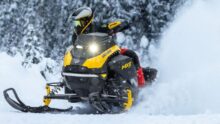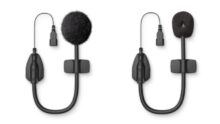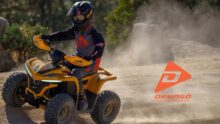Patent-infringement lawsuit filed against BRP re: PWC
News release
A patent-infringement suit has been filed against Bombardier Recreational Products Inc. and BRP U.S. Inc. alleging that the makers of the jet propulsion personal watercraft (PWC), Sea-Doo, have committed substantial acts of infringement, according to Hagens Berman.
The complaint, filed in the U.S. District Court for the Southern District of Florida, states that the companies have marketed, promoted, offered for sale, sold and distributed Sea-Doo personal watercraft that infringe on the intellectual property of its competitor Arctic Cat.
A long-standing safety concern in the PWC industry is the inability to steer a PWC once the throttle is released, as is common in emergency situations, particularly for inexperienced riders. According to the complaint, Arctic Cat was responsible for originally developing a novel and effective off-throttle thrust mechanism to make PWC safer. The technology provides riders with temporary “steerable thrust” when the rider turns in off-throttle situations to help prevent fatalities and injuries from collisions. Arctic Cat representatives demonstrated the technology to the Coast Guard, representatives of BRP and others in the PWC industry in 1999 and 2000.
The United States Patent and Trademark Office awarded Arctic Cat patents for its novel and valuable off-throttle steering technology, entitled “Watercraft with Steer-Response Engine Speed Controller” and “Controlled Thrust Steering System for Watercraft.”
According to the complaint, BRP originally attempted to provide off-throttle steering with an alternative technology called “Off-Power Assisted Steering” (OPAS) which relied on mechanical rudders in low and off-power situations. Ultimately, in 2009, BRP began transitioning its line of Sea-Doo PWC to “Off-Throttle Assisted Steering” (OTAS) technology that, according to the complaint, infringes the patents asserted by Arctic Cat.
“We believe strongly in our technology,” said Michael Okerlund, vice president of legal affairs at Arctic Cat. “Even after withdrawing from the PWC market, we continued to develop, demonstrate and patent our controlled-thrust technology as we believed it would save lives, and that it represented the best solution to the off-throttle steering problem. The fact that BRP moved to our technology validates our assessment.”
“In our view, this timeline of events paints a very clear picture,” said Nicholas Boebel, of-counsel at Hagens Berman. “From our investigation, it appears that after seeing Arctic Cat’s demonstration, BRP initially took a different approach but ultimately decided that its own solution was inadequate. Unfortunately, the way we see it, instead of choosing to be creative or approaching Arctic Cat directly, BRP simply took the technology that Arctic Cat worked hard to develop and protect.”
The suit states, “BRP determined that Arctic Cat’s OTAS technology provided enhanced rider safety and other benefits that were unavailable with BRP’s [Off-Power Assisted Steering] OPAS technology. On further information and belief, BRP’s adoption of OTAS technology has helped reduce the number of avoidable injuries and deaths from operation of Sea-Doo PWCs.”
“These acts of infringement have harmed and continue to harm Arctic Cat, and we believe that the company is entitled to relief as BRP has infringed upon Arctic Cat’s intellectual property,” Boebel added.






Even if true, this may potentially back-fire on Arctic Cat. To think that a company would sue on a safety feature that is good for the industry as a whole is not in their best interest.
They did not think this through – when it comes to safety, some things are best shared with others, even your competition. The potential for negative publicity, especially in the social society we live in, may do more harm than good.
The technology is important for sure. Arctic Cat is not saying they can’t use it, they are saying they should be compensated. If allegations are true, BRP should have licensed the technology from Arctic Cat.